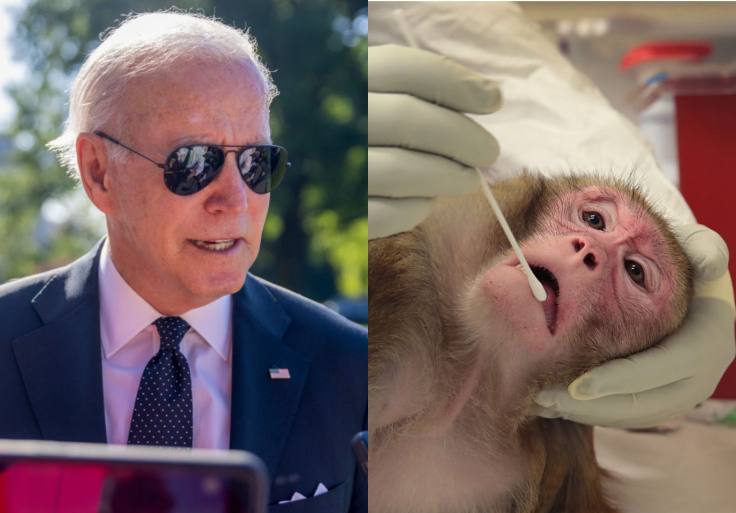The government-funded research project that created transgender monkeys is in turmoil after a Washington Free Beacon report exposed its existence, internal emails show.
Just days after the Free Beacon report on the study that injected male monkeys with female hormones, the study's lead researcher "expressed concerns" about publishing the results because his or her name would appear on the final report, according to internal communications obtained by the Free Beacon through a Freedom of Information Act request. Professor Mauricio Martins, who heads the study for Scripps Research, informed the National Institutes of Health of the development in a Jan. 19 email, complaining that his monkey-based research to determine why transgender women have high rates of HIV was "being twisted and berated by people who are not qualified to judge its merit."
The NIH official who received the email, Dr. Jeff Cummins, told Martins he stood by the study and called the Free Beacon's story "misinformation."
"Unfortunately, these are the times in which we live," Cummins wrote in his Jan. 20 response to Martins. "I am amazed by the misinformation that is so quickly spread on social media."
The emails are the latest example of public backlash derailing the Biden administration's radical spending initiatives. After the Free Beacon exposed in February that the Biden administration was funding the distribution of crack pipes to promote racial equity, for example, the New York Times reported that the "uproar" over the program "derailed" the administration's entire drug policy.
Cummins did not respond to a Free Beacon inquiry on what was "misinformation." A spokeswoman for Scripps Biomedical Research, which now operates in partnership with the University of Florida, told the Free Beacon the lead researcher had "concerns about the negative impact of prior media coverage and subsequent politicization of the research."
The NIH redacted the lead researcher's name from the now-public emails, and the researchers have yet to publish their findings from the study, which stopped receiving funding on April 1.
The initial Free Beacon report detailed how NIH-funded researchers at UF Scripps Biomedical Research injected male monkeys with feminizing hormone drugs to determine why transgender women have high rates of HIV. Researchers then tested the monkeys to determine if their immune systems were weakened in response to the simian immunodeficiency virus—the monkey equivalent of HIV.
The NIH-funded study faced criticism from animal rights groups, government accountability organizations, and transgender activists. Fox News host Tucker Carlson covered the Free Beacon story in a January segment with an official from PETA, which slammed the study as pointless and cruel.
"It's an experiment that an eighth-grade science student could figure out is totally meaningless," said Kathy Guillermo, vice president of the animal rights group.
The University of Florida said its researchers "stand behind its relevance."
"This important research is necessary to stay ahead of a global epidemic that has cost an estimated 35 million lives since 1981, and continues to affect an estimated 38 million people globally who are living with HIV," the group told the Free Beacon.
Cummins defended the study in internal emails, assuring Martins his efforts to address a "critical knowledge gap in gender-affirming hormone therapy" are "incredibly important."
Martins disclosed in the emails that he was caught off guard by the source of the backlash.
"To my surprise, the segments in question prompted a backlash on Twitter by the transgender community, who stands to gain the most by the research outlined," Martins wrote in the Jan. 19 email to Cummins.
The transgender monkey study is a part of a larger effort from the NIH to counter the spread of HIV in the transgender community, whose members are 49 times more likely to be infected with the disease than nontransgender individuals, according to the agency. Other NIH studies include a $155,000 project with a University of Alabama researcher to study how testosterone treatment for women weakens disease-fighting microorganisms in the vagina. A project at Emory University received $230,000 from the agency to study the rectum immune cells of transgender people.
The National Institute of Allergy and Infectious Diseases, which is run by Dr. Anthony Fauci, awarded $477,121 to the research project between December 2021 and April 2022. The NIH division acquires 400 to 600 rhesus macaque monkeys each year from a South Carolina island leased by Charles River Laboratories, which has a $27.5 million federal contract. The transgender monkey study used rhesus monkeys, although researchers acquired them from the Wisconsin National Primate Research Center.
Researchers kept the transgender monkeys alive after the study and returned them to their colony at the Wisconsin National Primate Research Center, according to documents obtained through the information request. The center did not respond to inquiries on the status of the monkeys after the hormone treatments.
